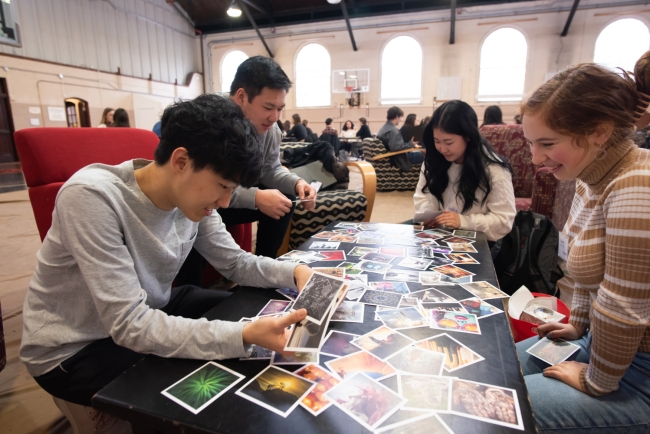You have /5 articles left.
Sign up for a free account or log in.

At Sophomore Bootcamp, small groups of students take sessions and do activities together throughout the three-day program.
Bowdoin College
When Solomon Aborbie was a sophomore at Bowdoin College in Maine, he had only a faint understanding of what he wanted to do with his life—or even what his options were. His mother and father, immigrants from Ghana, had worked in grocery stores and factories, so those were the jobs he knew the most about.
“By the time I got to Bowdoin, I had no clue there were other jobs out there,” he recalled. “I thought everyone who worked at JPMorgan was a bank teller. I thought Meta was run by Mark Zuckerberg by himself.”
Before college, his dream was to become a gym teacher. Now, a year after his graduation, he works as a cloud engineer at Google.
The turning point for Aborbie came during Bowdoin’s Sophomore Bootcamp, a mandatory program that students attend at the end of winter break in their second year. The three-day bootcamp, which just completed its fifth year, trains students in a wide range of job-hunting skills—from writing résumés to networking—and offers them exposure to an array of potential career pathways.
Sophomore Bootcamp includes both large sessions, in which students learn how to navigate Handshake, the job database Bowdoin uses, and smaller workshops, led by upperclassman volunteers.
With today’s graduates entering an increasingly tumultuous workforce—and public skepticism about the value of higher education on the rise—colleges and universities are seeking innovative ways to provide students with career-readiness education. Not every student on campus takes the initiative to visit the career center; a 2022 National Association of Colleges and Employers survey found that only about a quarter of undergraduates said they had gone to the career center for help landing an internship. At the same time, mandating job-skills courses or programs can be a burden on already-busy students.
Bowdoin seems to have found an effective solution in Sophomore Bootcamp, which provides a mandatory but short and impactful experience that students share with their classmates. Plus, they don’t have to disrupt their regular schooling to attend; students simply return from winter break a few days early.
To tailor the program to each class, the university’s career development staff surveys the sophomores each year to see what they are most interested in, which industries they want to hear about and what job skills they need help developing.
“That’s a good way for me to gauge, do students know what we’re going to deliver? And are we hitting it right? Are things shifting? Are students like, ‘No, no, résumés I’m good on. But I really want to know, how is employment changing or how can I negotiate my offer?’” said Bethany Walsh, senior associate director of skill development and programming, who coordinates Sophomore Bootcamp.
During Aborbie’s Sophomore Bootcamp, he attended a panel led by alumni who worked in consulting—and had a friend take notes for him at another panel on tech. He learned about roles like content writers and human resources managers in a session about résumé writing. And he gained perspective from his peers and the session leader, an upperclassman, who discussed their goals and past experiences.
The volume of information bordered on overwhelming. “It was sort of like drinking out of a fire hose,” Aborbie recalled. But it set him on path to declare a computer science minor, land a number of competitive internships and eventually begin working at Google, which many consider the crown jewel of tech companies.
‘Dedicated Time’
Kristin Brennan, executive director of career exploration and development at Bowdoin, said the program was invented as a sort of “stress intervention” to help students who want to prepare for their future careers but are swamped with classes, jobs and extracurricular activities. It’s also an important equity tool, she said, ensuring that all students have access to the same career-readiness training and resources.
“Students know that they have a dedicated time that is set aside for just this, just thinking about themselves, just exploring, trying ideas on for size, getting skills related to career in a way that the rest of the year they have to shove aside,” Brennan said. “They know it’s critically important, but it gets stressful when they defer it. So, they know they have this time. Somebody said, ‘I sleep better at night, right, knowing this is coming.’”
The boot camp occurs at a critical juncture in a Bowdoin education: just before students are required to declare a major. Matthew Hora, the founding director of the Center for Research on College-Workforce Transitions at the University of Wisconsin at Madison, said that although sophomore year may seem early for a university to mandate a career-development workshop, it aligns with other career trends. Many freshmen and sophomores now apply for internships, for example, whereas such positions used to be sought primarily by rising seniors.
“There’s been more of a push, and some of this is student-led, to take them earlier. Some of it is résumé-padding, but some of it is students saying, ‘I’d like to explore these career paths,’” Hora said. “I don’t think there’s a one-size-fits-all.”
Additionally, given how much students struggle to fit career-readiness education into their busy schedules, he said that the when is a secondary concern; what matters most is that an institution is able to give students such lessons at all.
“If we can get students basic exposure to these skills, that’s a win,” he said.





